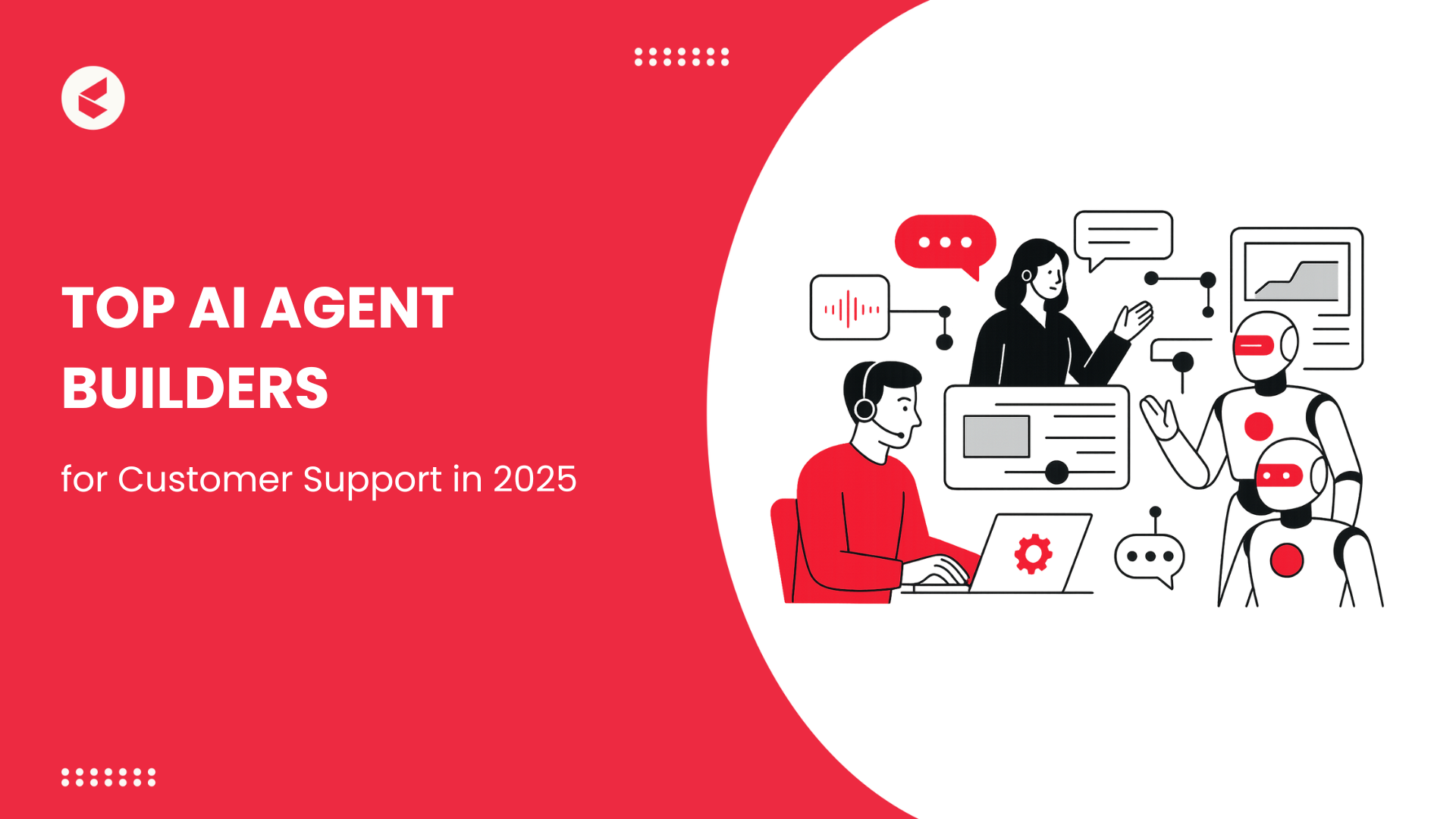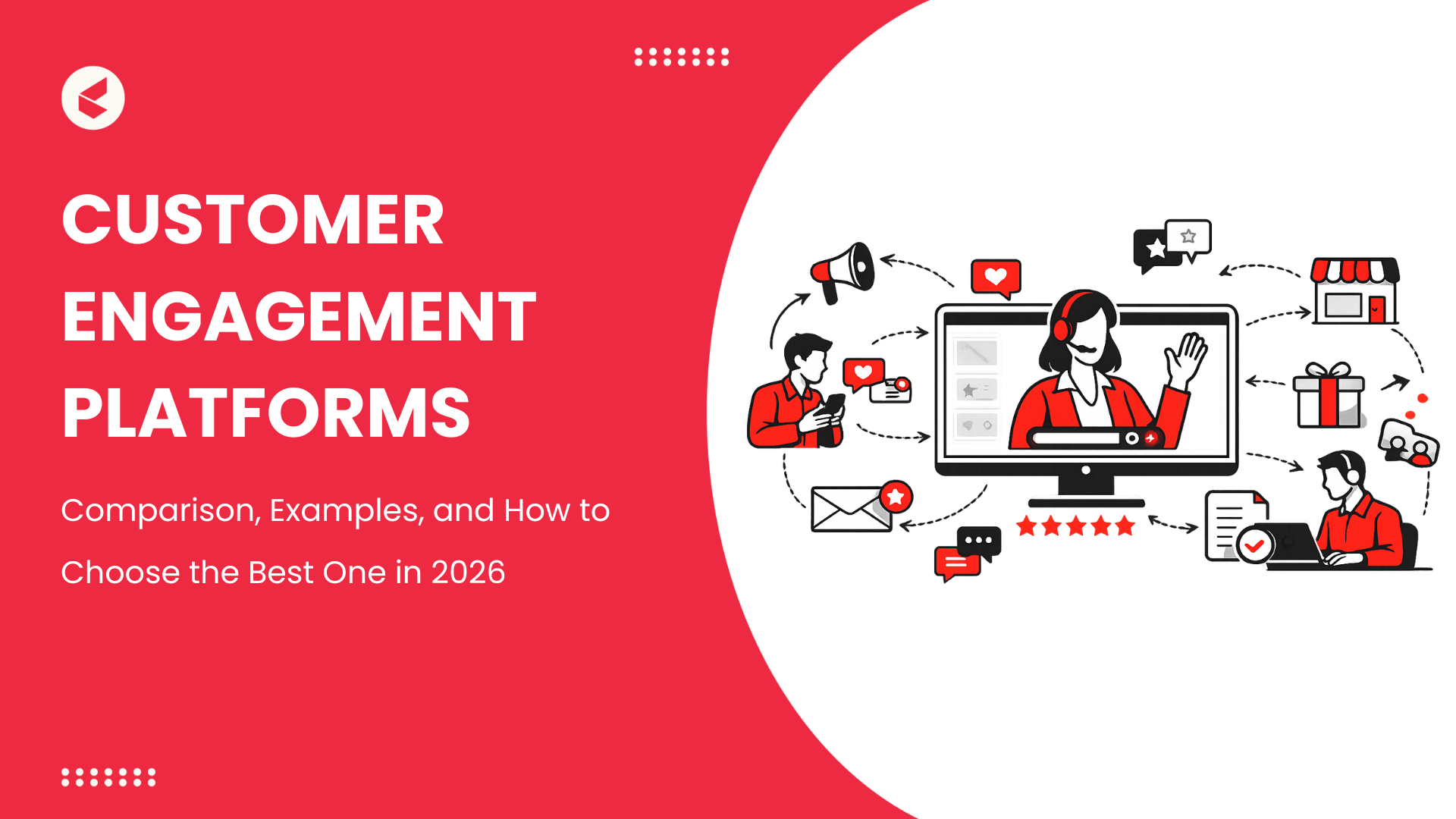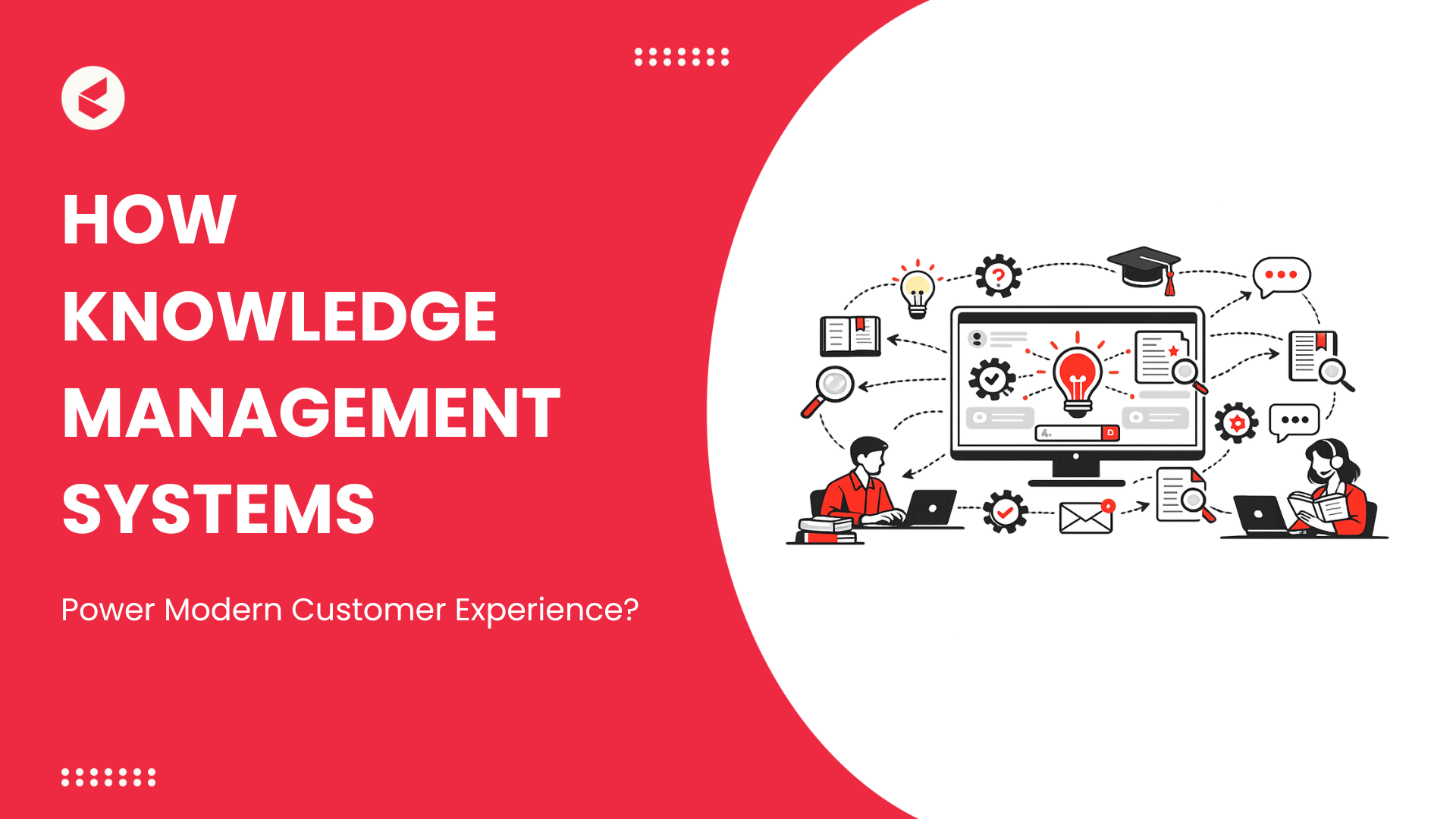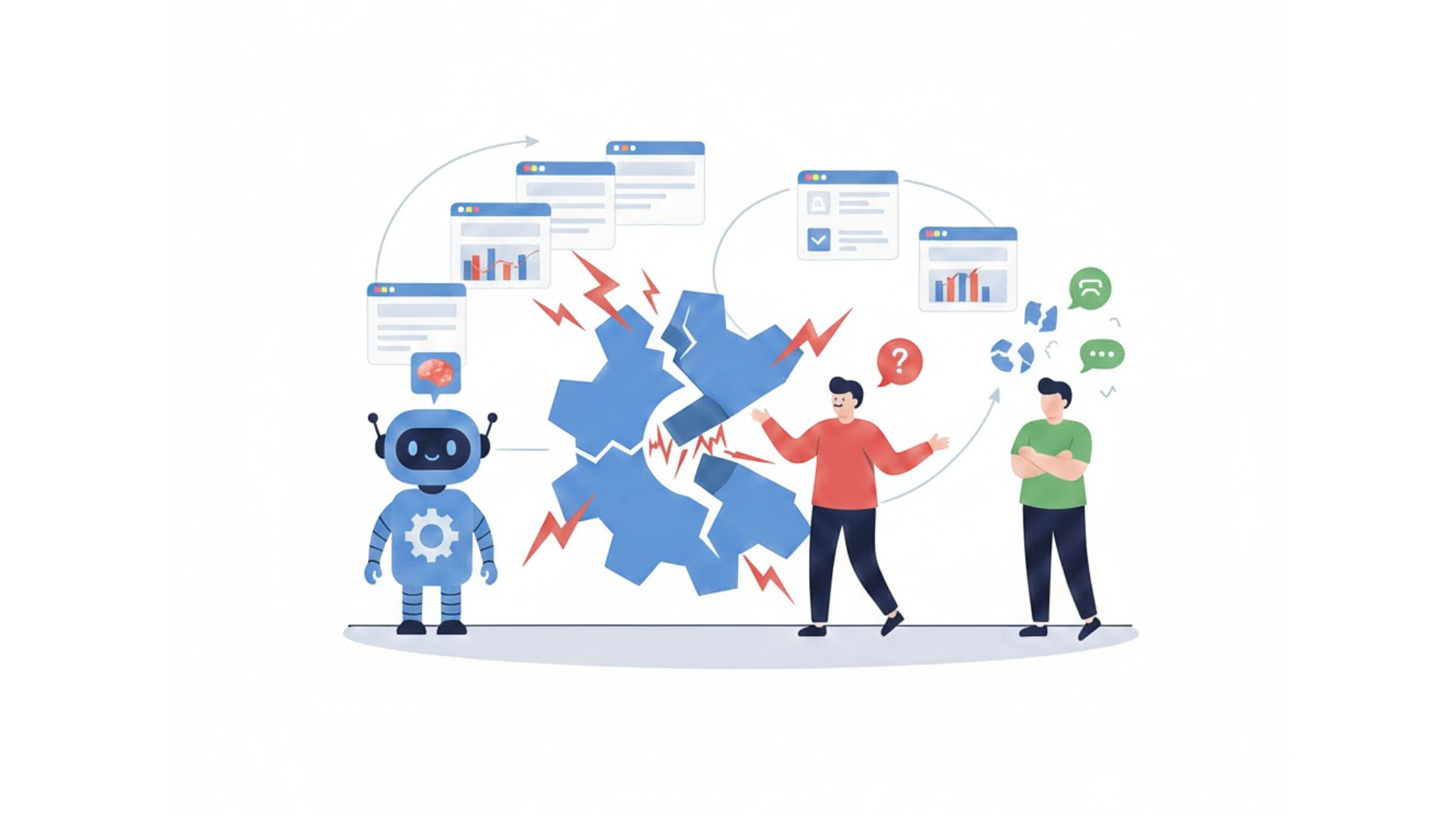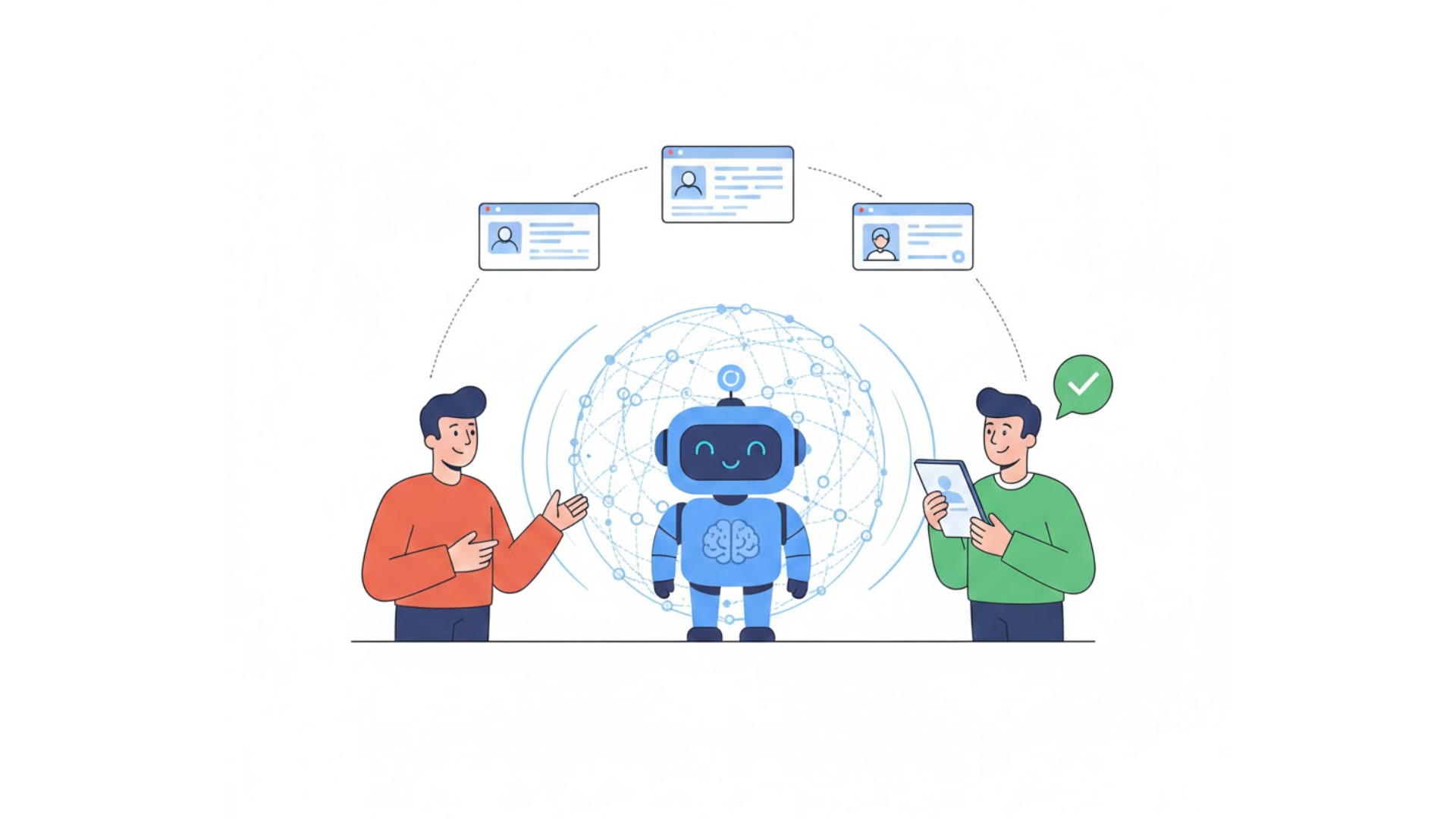AI agents are changing how businesses provide customer service. Customers now receive immediate, individualized responses in place of drawn-out wait times and repetitive inquiries. AI agent builders, which enable teams to develop, train, and oversee intelligent support agents without having to start from zero, are the driving force behind this change.
What makes them even more exciting is the rise of the no-code AI agent builder. These platforms give non-technical teams the power to design and deploy agents on their own. No need to depend on heavy IT support.
Enterprises are adopting these tools to reduce costs and scale customer service faster. From startups to large organizations, everyone is looking for the best AI agent builder to improve CX.
In 2026, these platforms are becoming essential for brands that want to stay competitive in customer support.
With the right platform, you can launch AI agents for support that resolve routine queries end-to-end, escalate edge cases smoothly, and keep costs predictable.
Comparison Table: Top AI Agent Builders for Customer Support in 2026
Your industry, team size, and technical configuration all play a role in selecting the best AI agent builder. While some platforms offer enterprise-grade workflows or significant customization, others concentrate on no-code simplicity.
Below is a side-by-side look at leading AI agent builder platforms in 2026.
| Tool Name | Best For | No-code | CX-Focus Features | Integrations | G2 Ratings | Open-Source |
| Kapture CX (Agent Suite) | Vertical-first, CX-focused | Yes | Smart routing, no-code workflow builder, omnichannel automation, AI + human handoff | CRM, ticketing, payment systems | 4.6 | No |
| Salesforce Agentforce Builder | Large enterprises, BFSI | Partial | Deep CRM integration, case routing, advanced analytics | Salesforce ecosystem, third-party APIs | 4.5 | No |
| Moveworks AI Agent Builder | Enterprise IT and CX teams | Partial | Multi-language support, workflow automation, employee + customer use cases | HR tools, Slack, Microsoft Teams | 4.6 | No |
| LiveChatAI | SMBs, eCommerce | Yes | Conversational templates, product recommendations, chat widget integration | Shopify, WooCommerce, Zapier | 4.6 | No |
| Insighto.ai | Enterprise IT and CX teams, SMBs, eCommerce | Yes | Omnichannel (voice + chat, 50+ languages) Personalized, context‑aware conversations Seamless handoff to human agents & workflow automation | CRMs (HubSpot, Zoho, Salesforce) and voice/SMS tools (Twilio, Telnyx, Plivo) | 4.8 | No |
| Kanerika AI Agent Builder | Enterprises, Retail | Partial | Complex workflow automation, analytics dashboards | ERP, CRMs, custom integrations | 5 | No |
| Zendesk AI Builder | Mid-size teams, SaaS | Yes | Ticket triage, auto-responses, macros inside Zendesk | Native Zendesk integrations | 4.3 | No |
| Freshdesk | SMBs, startups | Yes | Pre-built support flows, escalation routing, chat + email bots | Freshworks ecosystem, third-party apps | 4.4 | No |
| Dialogflow (Google) | Developers, BFSI | No | Strong NLP, multilingual, complex intent handling | Google Cloud, APIs | 4.4 | No |
| Rasa | Tech-heavy teams | No | Full customization, open-source workflows, high flexibility | Custom APIs, community connectors | 4 | Yes |
Top AI Agent Builders for 2026
An AI agent builder platform that works for a global enterprise may feel too heavy for a smaller support team, while some no-code AI agent builder software is perfect for fast rollouts.
Below, we compare the best AI agent builder software of 2026 to show where each one brings real value.
1. Kapture CX (Agent Suite)
Best For: CX-first, vertical-focused customer support teams that need quick time-to-value
Core Features:
- No-code workflow/agent builder
- Omnichannel ticketing
- Smart routing
- Guided agent assists
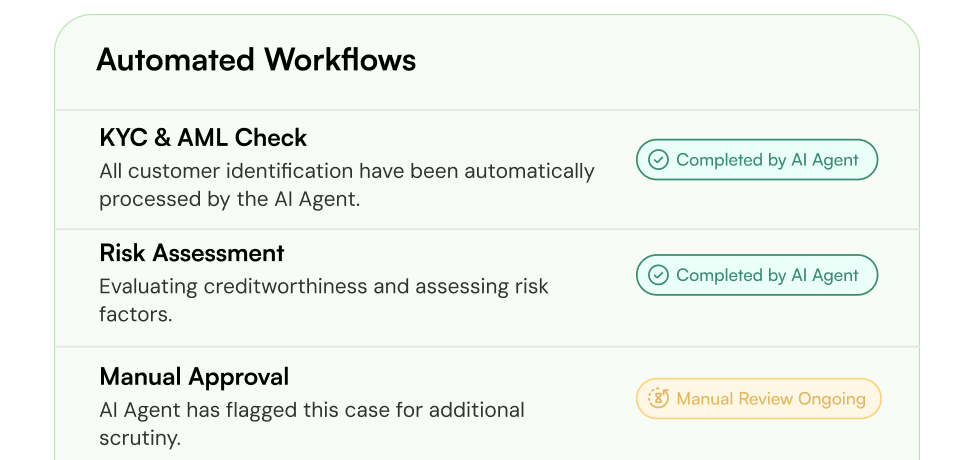
CX/Customer Support Fit: Built around ticket lifecycle and agent plus AI handoff, designed to improve CSAT and reduce AHT
AI and Automation:
- AI agents for self-serve
- Next-best-action suggestions and conversation summaries to speed resolutions
Analytics: Real-time reports and dashboards focused on agent productivity and resolution metrics
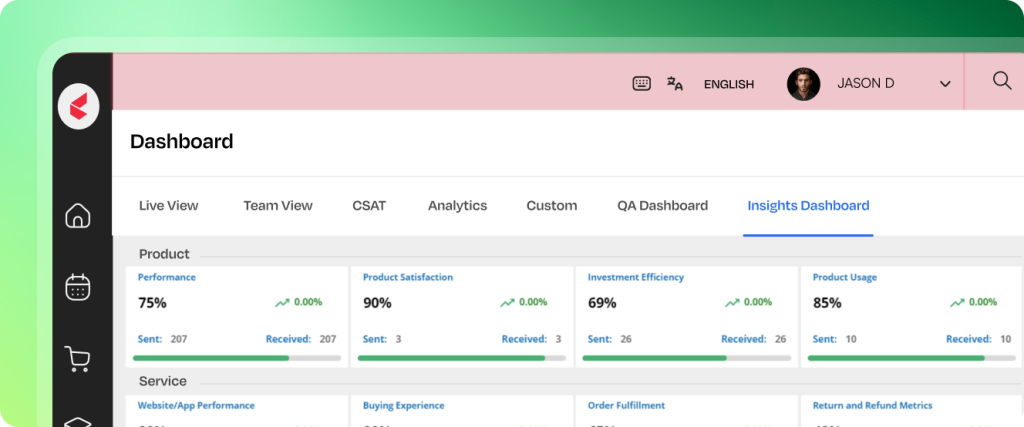
Strengths and Limitations:
- Strength: Vertical templates and no-code for support teams
- Limitation: Not open-source and takes a little time to configure everything
2. Salesforce Agentforce Builder
Best For: Enterprise customers already on Salesforce who want deep CRM-native automation
Core Features:
- Low-code AI agent builder
- Action libraries tied to Salesforce Flows, Apex, MuleSoft
CX/Customer Support Fit: Tight CRM context where agents can read or write records and trigger case workflows without external connectors
AI and Automation: Autonomous agents that take actions (e.g., update records, route cases) and can be constrained with guardrails
Analytics: Leverages Salesforce reporting and analytics for monitoring agent outcomes and business metrics
Strengths and Limitations:
- Strength: Unmatched CRM integration and enterprise controls
- Limitation: Better for Salesforce shops; complexity/price scales with customization
3. Moveworks AI Agent Builder
Best For: Large enterprises focusing on employee support and cross-system automation (IT, HR) with growing customer support uses
Core Features:
- Low-code agent studio
- Plugin-based access to enterprise systems
- Marketplace of pre-built automations
CX/Customer Support Fit: Useful where support queries require multi-system lookups and automated actions (e.g., entitlement checks, ticket ops)
Automation and AI: An agentic automation engine that executes multi-step workflows and enforces business policies
Analytics: Built-in tools to measure automation success, deflection rates, and action outcomes
Strengths and Limitations:
- Strength: Large-scale automation and connectors
- Limitation: High cost and operational overhead, geared primarily to complex environments
4. LiveChatAI
Best For: E-commerce sites that want simple, fast-to-deploy conversational bots
Core Features:
CX/Customer Support Fit: Good for FAQ deflection, product recommendations, and chat widget-based support on storefronts
AI and Automation:
- Uses generative models to answer from your data and can hand off to humans;
- Claims high deflection rates in SMB installs
Analytics: Standard chat analytics, A/B testing, and response quality metrics (platform-level dashboards)
Strengths and Limitations:
- Strength: Quick setup and multi-language reach
- Limitation: Fewer enterprise-grade controls and deeper integrations
5. Insighto.ai
Best For: Businesses seeking no-code AI agents across voice, chat, and web with seamless human handover.
Core Features
- No-code AI agent builder with drag-and-drop workflows
- Omnichannel agents (Voice, WhatsApp, Web Chat, Facebook Messenger)
- Human handover with full context transfer
- Real-time conversation analytics
- Integrations with CRMs, helpdesks, and telephony platforms
- Knowledge base ingestion from URLs, PDFs, documents
- AI Phone Agents with low-latency natural voice
- Web Calling Widget for instant browser-based calling
- Multi-language support
CX/Customer Support Fit: Best suited for teams needing fast, no-code voice and chat automation with seamless human handover.
AI and Automation: Delivers natural, low-latency AI agents across voice and chat for end-to-end workflow automation.
Analytics: Provides real-time conversational insights to optimize performance and improve customer experience.
Strength: Powerful voice AI, easy setup, and true omnichannel automation.
Limitation: Limited advanced templates for highly specialized enterprise use cases.
6. Kanerika AI Agent Builder
Best For: Enterprise customers needing custom agent workflows and heavier automation across departments
Core Features:
CX/Customer Support Fit: Designed to automate end-to-end workflows, useful for retail, finance and complex order and fulfillment flows
AI and Automation: Focus on hybrid agents that combine rules with machine learning to follow business policies and handle pre-built automations
Analytics: Emphasizes observability and simulates conversations to catch failure points before production
Strengths and Limitations:
- Strength: Enterprise workflow depth and pre-deployment testing
- Limitation: Newer vendor footprint vs. legacy incumbents
7. Zendesk AI Builder
Best For: Mid-market to enterprise teams already on Zendesk that want embedded AI agent creation
Core Features:
- Natural-language agent builder
- No-code integration builder
- Triage and macro suggestions inside Zendesk
CX/Customer Support Fit: Native ticket automation and agent assist, keeps context within the Zendesk Suite for smoother handoffs
AI and Automation: Intelligent triage, auto-assist, and agent copilots to suggest replies and reduce manual triage time
Analytics: Tracks time saved per ticket and resolution improvements via integrated reporting
Strengths and Limitations:
- Strength: Native UX and fast adoption for Zendesk users
- Limitation: Most powerful features require paid add-ons
8. Freshdesk (Freddy AI)
Best For: SMBs and teams that want easy templated automation inside Freshworks
Core Features:
- Freddy AI copilot auto-resolves email queries
- Facilitates ticket summarization, reply suggestions, and funneling to agents
CX/Customer Support Fit: Best for companies that want agent efficiency tools and simple auto-resolution without heavy engineering
AI and Automation:
Analytics: Built-in Freshworks dashboards track deflection, agent suggestions accepted, and time-saved
Strengths and Limitations:
- Strength: Simple setup and budget-friendly
- Limitation: Less flexible for bespoke enterprise workflows
9. Dialogflow (Google)
Best For: Developer-first teams that need strong natural language processing and voice plus text support at scale
Core Features:
Customer Support Fit: Ideal when you need advanced intent handling, multi-turn dialogues, and tight Google Cloud integrations
AI and Automation:
Analytics: Built-in conversation logging, session analysis, and Cloud monitoring options
Strengths and Limitations:
- Strength: Mature NLP and voice support
- Limitation: More developer-heavy than no-code SMB tools
10. Rasa
Best For: Tech teams that need full control, customization, and on-premise options
Core Features:
- Open-source NLP with dialogue management
- Composable pipelines
- Multi-channel connectors (Slack, Twilio, etc.)
CX/Customer Support Fit: Excellent when privacy, deep customization or unique business logic are required in support flows
AI and Automation:
Analytics: Requires external observability (or Rasa Pro) for enterprise analytics and telemetry
Strengths and Limitations:
- Strength: Highest flexibility and no vendor lock-in
- Limitation: Needs developer resources to build and maintain
What is an AI Agent Builder?
An AI agent builder is a platform that allows businesses to create, deploy, and manage AI-powered agents. These agents go a step beyond simple chat interactions.
They can understand context, take multi-step actions, and also predict customer needs. With AI agent builder platforms and AI agent builder software, companies don’t need to rely solely on developers to build complex systems.
The growth of this technology is hard to ignore. A MarketsandMarkets report found that the AI customer service market was worth $12.06 billion in 2024. It is further expected to reach $47.82 billion by 2030. This swift growth shows how essential these tools are becoming for customer experience.
Traditional chatbots usually answer predefined questions. However, AI agents can engage in meaningful conversations with customers.
The table below will help you understand the main differences between them:
| Feature | Traditional Chatbots | AI Agents (Built with AI Agent Builder Platforms) |
| Responses | Predefined, scripted | Context-aware and personalized |
| Capabilities | Limited to FAQs | Multi-step actions and problem solving |
| Learning Ability | Static, no improvement | Improves with data and training |
| Customer Experience | Basic support, often frustrating | Proactive, scalable, human-like support |
Why Businesses Need AI Agent Builders in Customer Support?
Support teams everywhere are stretched thin. Customer queries keep rising, and adding more staff only drives costs higher. An AI agent builder solves this by automating the routine while keeping the service reliable.
The benefits are hard to ignore:
- Always Available: AI agents work 24/7 and handle general issues like order updates, password resets, etc.
- Faster Resolutions: They cut average handle time (AHT) and clear backlogs quickly
- Personalized Support: AI adapts to intent and offers tailored answers instead of canned replies
- Lower Costs: Automating repetitive work frees human agents for complex cases
Still, AI doesn’t replace human agents. Instead, it works alongside them. The best setups use guardrails to maintain accuracy and smooth handoffs to human support when needed. Businesses deliver consistent service without losing the empathy that only people can provide as a result of this balance.
AI agent builder platforms create a support model where automation and an AI chatbot handle the routine, and human agents focus on valuable interactions.
Main Features to Look for in an AI Agent Builder
If you’ve ever tested an AI tool that looked great in a pitch but fell apart in real use, you know the pain. An AI agent builder can be the same. On paper, they all sound powerful. In reality, only a few deliver the features that actually matter in day-to-day support.
To get real value, focus on features that directly improve support operations and customer experience. Here’s what really matters:
1. No-Code Design Tools
A good no-code AI agent builder should let teams build and adjust agents without writing code. Look for drag-and-drop flows and reusable templates. This makes it easy for non-technical staff to update responses as well as create new workflows on the fly.
2. Omnichannel Support
Customers don’t stick to one channel. The best AI agent builders for customer support cover voice, live chat, email, SMS, and apps like WhatsApp or Messenger. One unified platform ensures consistent answers everywhere, without siloed systems.
3. Pre-Built Workflows
Agents should come with ready-to-use flows for common cases like refunds, cancellations, appointment booking, or ticket escalation. These AI agent creation tools save setup time and reduce errors since you’re not reinventing the wheel for every scenario.
4. LLM/NLP Brains
Natural conversations are non-negotiable. The platform should handle intent recognition, context switching, variations in phrasing, multi-step actions, and more. A clunky or scripted feel will frustrate customers faster than long wait times.
5. Analytics and Observability
The right AI agent builder software used by top brands like CBDFx provides dashboards for response accuracy, resolution time, and drop-off rates. These insights show where agents perform well and where retraining and workflow changes are needed.
6. Integrations
If the AI agent can’t connect to your CRM, booking system, or payment gateway, it becomes a dead end. Seamless integrations are what make automation actually work.
Why No-Code AI Agent Builders Stand Out?
No-code AI agent builders are giving support teams real control. Instead of waiting for developers, managers can build agents and workflows themselves. This democratizes AI, letting the people who understand customer needs shape the support experience directly.
Another reason why AI agent builder platforms stand out is that their deployment is quite fast. For example, a travel company used a no-code AI agent builder to create a refund workflow in just a few hours, something that used to take weeks. Staff could drag, drop, and connect steps without touching a single line of code.
Finally, these tools also reduce errors. Pre-built templates and guided flows make it simple to design reliable experiences.
In short, no-code platforms reduce IT dependency and empower support teams to act quickly. They make it easy to turn everyday tasks (like refunds, ticket escalation, or cancellations), into automated workflows that actually work.
Challenges and Risks of AI Agent Builders
While AI agent builders can transform customer support, they come with notable challenges. Some of the major ones are listed below:
- Hallucinations: AI agents can provide incorrect or misleading responses, which can harm customer trust and create operational errors.
- Compliance Concerns: In regulated industries (finance, healthcare, and personal data), inaccurate AI responses can lead to legal and compliance issues.
- Integration Complexity: Enterprises often have multiple CRMs and legacy systems. Connecting AI agents requires careful workflow mapping and robust APIs. Poor integration can break automations or produce inconsistent experiences.
- Agent Adoption Barriers: If workflows seem unclear, too complicated, or add to cognitive burden, support staff may be resistant to AI. Adoption may be hampered by unclear instructions and training.
- The Necessity for Guardrails: AI agents must operate within escalation protocols and monitoring frameworks. Without constraints, agents can make costly mistakes.
- Human-in-the-Loop Requirement: Human monitoring is still necessary in critical edge cases or situations needing empathy. CX may be jeopardized by fully autonomous implementation without scrutiny.
- Operational Risk: Unchecked AI implementations can slow resolution by increasing escalations or creating inconsistent experiences, negating the intended efficiency gains.
Future of AI Agent Builders in CX
The next wave of AI agent builders is moving beyond simple chatbots to agentic AI. The Agentic AI global market size will increase from $7.55 billion in 2025 to around $199.05 billion by 2034, as stated by the Presedence Report. These agents can handle entire customer journeys, from first contact to resolution, without constant human intervention, while still escalating complex cases as needed.

We’re also seeing the rise of vertical-specific AI agent builders as the global vertical AI market is expected to be worth $115.4 billion by 2034, according to Market.us. Platforms tailored for travel, BFSI, retail, and other industries are emerging, with pre-built workflows, compliance guardrails, and industry knowledge baked in.
At the same time, observability and explainability are becoming essential. Enterprises demand transparency: monitoring how AI decisions are made and understanding why an agent suggested a particular action. This builds trust internally and guarantees consistent customer experiences and compliance with regulations.
Kapture’s vertical-first CX approach exemplifies this trend. By providing pre-configured, industry-specific workflows and full observability, Kapture allows support teams to leverage agentic AI effectively while maintaining control and improving outcomes.
Conclusion
AI agent builders are quickly becoming essential for modern support teams. They help businesses handle more queries quickly and deliver truly personalized experiences. From OTAs and retail to BFSI and large enterprises, the impact is quite evident.
The real advantage comes from CX-first, no-code platforms. These let the teams who know customers best build and manage workflows themselves, without waiting on IT, making support faster and more reliable.
Kapture’s vertical-first approach takes this a step further with pre-built industry workflows and full visibility to help teams automate with confidence.
See how Kapture’s AI is helping enterprises reimagine customer support on our Agent Suite page.
FAQs
AI agent builder platforms usually include built-in NLP and translation capabilities. This lets businesses deploy support agents that understand and respond in multiple languages. Thus, ensuring consistent experiences for customers across different regions.
Modern AI agent builder platforms often support voice channels like IVR and smart assistants. Therefore, businesses can automate customer interactions across both text and voice while creating a smooth omnichannel support experience.
Indeed, a lot of sophisticated AI agent builders do real-time sentiment analysis on customers. These agents can prioritize important tickets, highlight dissatisfied clients, and offer tailored solutions to increase satisfaction by keeping an eye on tone, keywords, and engagement patterns.
